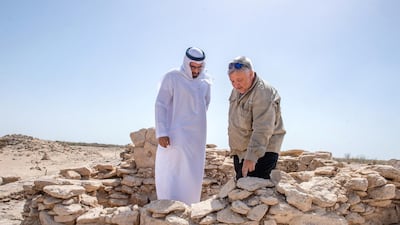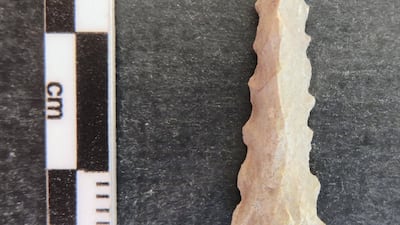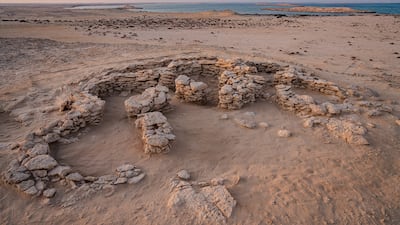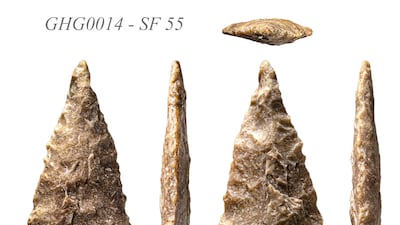Archaeologists in Abu Dhabi have unearthed startling new evidence of the first known buildings in the Emirates dating back more than 8,500 years — at least 500 years earlier than previously thought.
The fascinating findings by experts from the capital's Department of Culture and Tourism were made on the island of Ghagha, west of Abu Dhabi.
The discovery of the stone structures, which likely housed the country's first communities, sheds new light on early chapters of the country's rich history.
It was believed that long-distance maritime trade routes which developed during the Neolithic period were the catalyst for settlements in the area, but the latest discovery proves that Neolithic settlements existed before then.
The DCT team have been using cutting-edge techniques to help unravel the history of the country.
The biggest discovery was revealed by carbon-14 analysis of charcoal fragments, which indicated the structures were at least 8,500 years old — breaking the previous record for the earliest known structures built in the UAE, which were detected on Marawah Island, also off the coast of Abu Dhabi.
“These archaeological finds have shown that people were settling and building homes here 8,500 years ago. The discoveries on Ghagha Island highlight that the characteristics of innovation, sustainability and resilience have been part of the DNA of the inhabitants of this region for thousands of years,” said Mohamed Al Mubarak, Chairman of DCT Abu Dhabi.
“The finds reinforce an appreciation of history, as well as the deep cultural connections between the people of the UAE and the sea.
“We are also reminded that there is still much to discover across the emirate of Abu Dhabi, and that it is vitally important we continue working to discover, preserve and protect our invaluable heritage for current and future generations to learn more about our ancestral past.”
The new evidence, along with the previous findings on the island of Marawah, indicate the islands of Abu Dhabi were a focal point of human innovation and settlement during the Neolithic period, the last stage of the stone age which is viewed as a key era in the development of humanity across the globe.
What did experts find?
The ancient structures were simple round rooms, the walls of which were made of stone and preserved to nearly one metre in height.
It is believed they were probably houses for small communities who inhabited the island year-round.
Hundreds of artefacts were found in the rooms, including finely worked stone arrowheads that would have been used for hunting.
It is likely that the community would also have used the rich resources of the sea. How long the settlement existed is unknown, but after it was abandoned, it apparently remained an important part of the cultural landscape, as nearly 5,000 years ago a person was buried in the ruins of the structures. It is one of the few burials from this period known on the Abu Dhabi islands.
Digging deep into the past
The significant findings on Ghagha Island are just the latest success story for the tourism department's emirate-wide archaeological programme.
In addition to the breakthroughs at Ghagha and Marawah islands, teams have uncovered the remains of an ancient monastery on Sir Bani Yas Island, as well as the Unesco-inscribed Cultural Site of Al Ain, comprising a series of oases, historic monuments, archaeological sites and natural areas, which has been a World Heritage Site since 2011.
Abu Dhabi's historic treasure trove also includes Miocene Trackways — footprints of a herd of an extinct form of ancient elephant — which six to eight million years ago; a 3,000 year old falaj in Al Ain, indicating the earliest known widespread use of this irrigation technology in the world; stone tools dating more than 300,000 years ago, which were found in surveys around Jebel Hafit; and a well preserved Iron Age fortress dating back 3,000 years, which was discovered during excavations at Al Ain’s Hili 14 archaeological site.
A series of late pre-Islamic tombs have also been found in various locations in Al Ain.
UAE currency: the story behind the money in your pockets
THE SIXTH SENSE
Starring: Bruce Willis, Toni Collette, Hayley Joel Osment
Director: M. Night Shyamalan
Rating: 5/5
England squad
Joe Root (captain), Alastair Cook, Keaton Jennings, Gary Ballance, Jonny Bairstow (wicketkeeper), Ben Stokes (vice-captain), Moeen Ali, Liam Dawson, Toby Roland-Jones, Stuart Broad, Mark Wood, James Anderson.
Quick pearls of wisdom
Focus on gratitude: And do so deeply, he says. “Think of one to three things a day that you’re grateful for. It needs to be specific, too, don’t just say ‘air.’ Really think about it. If you’re grateful for, say, what your parents have done for you, that will motivate you to do more for the world.”
Know how to fight: Shetty married his wife, Radhi, three years ago (he met her in a meditation class before he went off and became a monk). He says they’ve had to learn to respect each other’s “fighting styles” – he’s a talk it-out-immediately person, while she needs space to think. “When you’re having an argument, remember, it’s not you against each other. It’s both of you against the problem. When you win, they lose. If you’re on a team you have to win together.”
'Falling%20for%20Christmas'
%3Cp%3EDirector%3A%20Janeen%20Damian%3Cbr%3E%3Cbr%3EStars%3A%20Lindsay%20Lohan%2C%20Chord%20Overstreet%2C%20Jack%20Wagner%2C%20Aliana%20Lohan%3Cbr%3E%3Cbr%3ERating%3A%201%2F5%3C%2Fp%3E%0A
KILLING OF QASSEM SULEIMANI
Engine: 3.5-litre V6
Transmission: eight-speed automatic
Power: 290hp
Torque: 340Nm
Price: Dh155,800
On sale: now
Five%20calorie-packed%20Ramadan%20drinks
%3Cp%3E%3Cstrong%3ERooh%20Afza%3C%2Fstrong%3E%0D%3Cbr%3E100ml%20contains%20414%20calories%0D%3Cbr%3E%3Cstrong%3ETang%20orange%20drink%3C%2Fstrong%3E%0D%3Cbr%3E100ml%20serving%20contains%20300%20calories%0D%3Cbr%3E%3Cstrong%3ECarob%20beverage%20mix%3C%2Fstrong%3E%0D%3Cbr%3E100ml%20serving%20contains%20about%20300%20calories%0D%3Cbr%3E%3Cstrong%3EQamar%20Al%20Din%20apricot%20drink%3C%2Fstrong%3E%0D%3Cbr%3E100ml%20saving%20contains%2061%20calories%0D%3Cbr%3E%3Cstrong%3EVimto%20fruit%20squash%3C%2Fstrong%3E%0D%3Cbr%3E100ml%20serving%20contains%2030%20calories%3C%2Fp%3E%0A
COMPANY%20PROFILE
%3Cp%3E%3Cstrong%3EName%3A%20%3C%2Fstrong%3EElmawkaa%3Cbr%3E%3Cstrong%3EBased%3A%3C%2Fstrong%3E%20Hub71%2C%20Abu%20Dhabi%3Cbr%3E%3Cstrong%3EFounders%3A%3C%2Fstrong%3E%20Ebrahem%20Anwar%2C%20Mahmoud%20Habib%20and%20Mohamed%20Thabet%3Cbr%3E%3Cstrong%3ESector%3A%3C%2Fstrong%3E%20PropTech%3Cbr%3E%3Cstrong%3ETotal%20funding%3A%3C%2Fstrong%3E%20%24400%2C000%3Cbr%3E%3Cstrong%3EInvestors%3A%20%3C%2Fstrong%3E500%20Startups%2C%20Flat6Labs%20and%20angel%20investors%3Cbr%3E%3Cstrong%3ENumber%20of%20employees%3A%3C%2Fstrong%3E%2012%3Cbr%3E%3C%2Fp%3E%0A
UAE currency: the story behind the money in your pockets
Labour dispute
The insured employee may still file an ILOE claim even if a labour dispute is ongoing post termination, but the insurer may suspend or reject payment, until the courts resolve the dispute, especially if the reason for termination is contested. The outcome of the labour court proceedings can directly affect eligibility.
- Abdullah Ishnaneh, Partner, BSA Law
The Scale for Clinical Actionability of Molecular Targets
The Internet
Hive Mind
four stars
The specs: Macan Turbo
Engine: Dual synchronous electric motors
Power: 639hp
Torque: 1,130Nm
Transmission: Single-speed automatic
Touring range: 591km
Price: From Dh412,500
On sale: Deliveries start in October
Wicked: For Good
Director: Jon M Chu
Starring: Ariana Grande, Cynthia Erivo, Jonathan Bailey, Jeff Goldblum, Michelle Yeoh, Ethan Slater
Rating: 4/5
Fireball
Moscow claimed it hit the largest military fuel storage facility in Ukraine, triggering a huge fireball at the site.
A plume of black smoke rose from a fuel storage facility in the village of Kalynivka outside Kyiv on Friday after Russia said it had destroyed the military site with Kalibr cruise missiles.
"On the evening of March 24, Kalibr high-precision sea-based cruise missiles attacked a fuel base in the village of Kalynivka near Kyiv," the Russian defence ministry said in a statement.
Ukraine confirmed the strike, saying the village some 40 kilometres south-west of Kyiv was targeted.
Mercer, the investment consulting arm of US services company Marsh & McLennan, expects its wealth division to at least double its assets under management (AUM) in the Middle East as wealth in the region continues to grow despite economic headwinds, a company official said.
Mercer Wealth, which globally has $160 billion in AUM, plans to boost its AUM in the region to $2-$3bn in the next 2-3 years from the present $1bn, said Yasir AbuShaban, a Dubai-based principal with Mercer Wealth.
“Within the next two to three years, we are looking at reaching $2 to $3 billion as a conservative estimate and we do see an opportunity to do so,” said Mr AbuShaban.
Mercer does not directly make investments, but allocates clients’ money they have discretion to, to professional asset managers. They also provide advice to clients.
“We have buying power. We can negotiate on their (client’s) behalf with asset managers to provide them lower fees than they otherwise would have to get on their own,” he added.
Mercer Wealth’s clients include sovereign wealth funds, family offices, and insurance companies among others.
From its office in Dubai, Mercer also looks after Africa, India and Turkey, where they also see opportunity for growth.
Wealth creation in Middle East and Africa (MEA) grew 8.5 per cent to $8.1 trillion last year from $7.5tn in 2015, higher than last year’s global average of 6 per cent and the second-highest growth in a region after Asia-Pacific which grew 9.9 per cent, according to consultancy Boston Consulting Group (BCG). In the region, where wealth grew just 1.9 per cent in 2015 compared with 2014, a pickup in oil prices has helped in wealth generation.
BCG is forecasting MEA wealth will rise to $12tn by 2021, growing at an annual average of 8 per cent.
Drivers of wealth generation in the region will be split evenly between new wealth creation and growth of performance of existing assets, according to BCG.
Another general trend in the region is clients’ looking for a comprehensive approach to investing, according to Mr AbuShaban.
“Institutional investors or some of the families are seeing a slowdown in the available capital they have to invest and in that sense they are looking at optimizing the way they manage their portfolios and making sure they are not investing haphazardly and different parts of their investment are working together,” said Mr AbuShaban.
Some clients also have a higher appetite for risk, given the low interest-rate environment that does not provide enough yield for some institutional investors. These clients are keen to invest in illiquid assets, such as private equity and infrastructure.
“What we have seen is a desire for higher returns in what has been a low-return environment specifically in various fixed income or bonds,” he said.
“In this environment, we have seen a de facto increase in the risk that clients are taking in things like illiquid investments, private equity investments, infrastructure and private debt, those kind of investments were higher illiquidity results in incrementally higher returns.”
The Abu Dhabi Investment Authority, one of the largest sovereign wealth funds, said in its 2016 report that has gradually increased its exposure in direct private equity and private credit transactions, mainly in Asian markets and especially in China and India. The authority’s private equity department focused on structured equities owing to “their defensive characteristics.”
EA Sports FC 25
Developer: EA Vancouver, EA Romania
Publisher: EA Sports
Consoles: Nintendo Switch, PlayStation 4&5, Xbox One and Xbox Series X/S
Rating: 3.5/5










